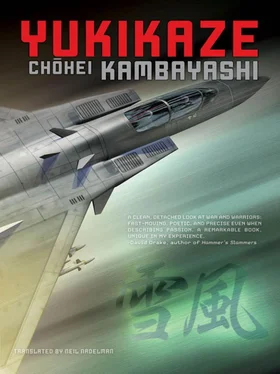Despite the fact that words and machines were created by humans they possess an independence and autonomy, moving on their own in ways which those who create them don’t anticipate. No, perhaps this definition is backwards as well. If they did not act on their own, they wouldn’t deserve to be called “machines” and “words.” So then, exactly what sort of being is a human, whose only means of affecting the natural world is through these mysterious things that he has no hope of exerting complete control over? Does the essence of being human really lie in the words and machines we create, with the thing we call “self ” merely a cast-off shell that remains here? And if our words and machines are what affect the world, won’t we eventually become unnecessary to them? “No,” Rei Fukai might mutter. “Humans are necessary in battle.”
When we delve deeper into the relationship between humans and words and machines, we end up running into the question of what the “self ” means in relation to a human. I’m not referring to the personal meaning of the so-called search for self. For example, as far as humans are concerned, self is not limited to the hardware that genetics bestows on us. Just as people who have lost an arm or a leg can experience the phenomenon of sensing a phantom limb, humans also have the ability to accept something added to their bodies as being part of themselves. I don’t mean that they become accustomed to them as tools or machines but that they are literally regarded as a part of the body.
The same goes for the mind. I hate to express it in such a complicated way, but there’s no evidence at all that the “you” which you believe to be yourself is actually real. That which you call your “real self ” is an extremely nebulous thing because humans, as social beings, cannot help but incorporate their valuation by others in the construction of their self-image. The nonsense you hear of “I’ve found my true self ” is a bit like having a piece of white paper painted black with only a bit of white left in the middle, and then having the white part insist “I am a white circle.”
I also regard with suspicion those who say that society and other individuals have no impact on them, those who view “I” as a single-cognizance subject. A being capable of recognizing that “I am here” cannot help but have its existence affected by, if nothing else, the simple impact generated by the act of observing itself. This is what the Heideggerian school of philosophy refers to as dasein , which roughly translates as “being there” or “presence.” While this is carried in rather pretentious-sounding concepts like geworfene Entwurf (literally, “a thrown projection”), it can be summed up crudely as the existence which is detached from the being who is “existing.” If a being exists in actual reality, its existence is not predicated on any description or understanding, and so a being that exists constantly saying “I am here” is engaged in a pointless reflexivity that is nothing more than ridiculous or pathetic. The moment that you are cognizant of “I,” a definitive separation is formed between you and that concept of “I.” If this cognizance doesn’t occur, then no concept of “I” will arise.
It seems that we humans, from the first moment of our being human, from the moment of creating the phenomenon of self, became sad creatures who constantly estrange ourselves from the natural world. Whether philosophically, psychologically, or by any other means, the more we try to contrive some sort of a reason for our existence, the more we seem to whittle away at our ourselves. Humans are, themselves, machines. They are also words. So where in this battle with the natural world do humans fit in?
This quibbling of mine has dragged on too long. Yukikaze grants us its charming insight without having to engage in such a sophistic buildup. “Humans are necessary in battle.” Kambayashi surely keeps writing science fiction to say this over and over again. Though it seems as if he constantly says in the novel that humans are manipulated by words and machines, that there’s no real need for humans and that everything should be left to the words and the machines, we cannot take these statements at face value. The more Kambayashi tries to impart power to words and machines—the more he tries to make what is human into what is inhuman—the more he succeeds in throwing the concept of humanity into sharper and more vivid relief. Rather than humanity just dissolving into nothingness, we see just how “Humans are necessary in battle.” Kambayashi is a unique author who writes about “humanity” by destroying it, in a style that nobody else can copy. If he were to be told that he couldn’t portray humanity, meaning that he couldn’t portray the clichéd emotions that you find rolling around anywhere in ordinary reality, he would probably take it as a compliment.
In 1999, fifteen years after Rei Fukai muttered “Humans are necessary in battle,” Kambayashi unleashed his carefully prepared sequel, Good Luck, Yukikaze, upon the world. As if his intervening works had meticulously laid the groundwork for a new flight for Yukikaze, the novel was a masterpiece that drew on fifteen years of battle victories. In the first book, humans faced the threat of having their reality collapse under the power of “words” and “machines”; the struggles of the characters left the reader with a strong impression of trauma and confusion. (And because of that, the author earned such comparisons as “the Philip K. Dick of Japan.”) In the sequel, however, humans seemed to be slowly but surely gathering the strength to take back their “world.” We may be beings who are trapped in ignorance, who are manipulated by other beings or things beyond our comprehension, but: we are human and we are here, and people are necessary for battle. Got a problem with that? Or so the characters seem to say. And before long, the inhabitants of Kambayashi’s world, these people who use words and machines as an interface to a natural world from which they are estranged, no longer seem weak but rather resolutely strong as they rise to confront that world. You could say that he’s gone from “If you’re not dancing, you’ll probably be made to dance,” the epigraph of Kitsune to Odore (Dance with a Fox), to “If you’re being made to dance, then dance it your way.” For example, this trend became extremely pronounced in 2001’s Eikyuu Kikan Souchi (Eternal Return Device). The novel’s characters fought with the author in a similarly strange situation, with the thrillingly depicted story of manufactured humans arguing with a superior being that could freely create and edit space.
I hope that those who have picked up this copy of Yukikaze will continue on and read its sequel, Good Luck, Yukikaze . It epitomizes the whole history of the evolution of Kambayashi’s work. (I can’t call it “growth,” because it’s evolution for the purpose of survival.) From that perspective, you can truly call Yukikaze Chōhei Kambayashi’s life’s work.
In bringing the JAM threat to her readers’ attention, journalist Lynn Jackson says this: “The digital world seems to run counter to the very essence of our humanity. Our language as well. Our civilization itself. So what, exactly, are we doing turning over more and more of our existence to computers?” It’s true that “our civilization” may run counter to human nature. So is the answer to go back to nature? I have a feeling that’s what the JAM would want. Placing human beings on this grinding battlefield that dehumanizes them, repeating “People are necessary in battle” over and over is what allows us humans to remain human in the face of the JAM. Your weapons are the words and machines you couldn’t otherwise comprehend. When you tire of the battle, you would do well to listen to the words of a soldier from Good Luck, Yukikaze : “It’s not a question of what you should do, but rather what you want to do. That’s the answer.”
Читать дальше












